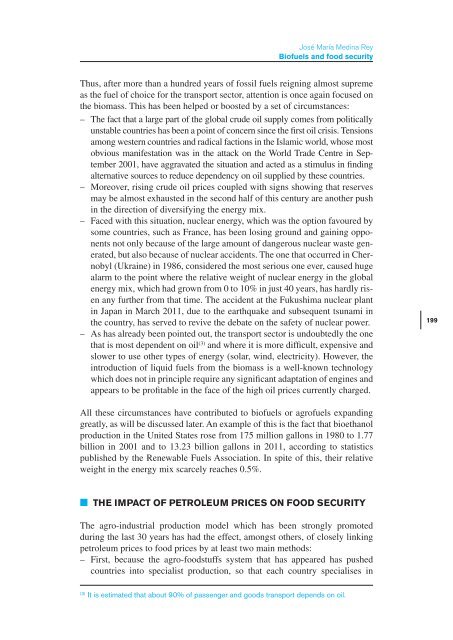Food security and global security - IEEE
Food security and global security - IEEE
Food security and global security - IEEE
- No tags were found...
Create successful ePaper yourself
Turn your PDF publications into a flip-book with our unique Google optimized e-Paper software.
José María Medina ReyBiofuels <strong>and</strong> food <strong>security</strong>Thus, after more than a hundred years of fossil fuels reigning almost supremeas the fuel of choice for the transport sector, attention is once again focused onthe biomass. This has been helped or boosted by a set of circumstances:––The fact that a large part of the <strong>global</strong> crude oil supply comes from politicallyunstable countries has been a point of concern since the first oil crisis. Tensionsamong western countries <strong>and</strong> radical factions in the Islamic world, whose mostobvious manifestation was in the attack on the World Trade Centre in September2001, have aggravated the situation <strong>and</strong> acted as a stimulus in findingalternative sources to reduce dependency on oil supplied by these countries.––Moreover, rising crude oil prices coupled with signs showing that reservesmay be almost exhausted in the second half of this century are another pushin the direction of diversifying the energy mix.––Faced with this situation, nuclear energy, which was the option favoured bysome countries, such as France, has been losing ground <strong>and</strong> gaining opponentsnot only because of the large amount of dangerous nuclear waste generated,but also because of nuclear accidents. The one that occurred in Chernobyl(Ukraine) in 1986, considered the most serious one ever, caused hugealarm to the point where the relative weight of nuclear energy in the <strong>global</strong>energy mix, which had grown from 0 to 10% in just 40 years, has hardly risenany further from that time. The accident at the Fukushima nuclear plantin Japan in March 2011, due to the earthquake <strong>and</strong> subsequent tsunami inthe country, has served to revive the debate on the safety of nuclear power.––As has already been pointed out, the transport sector is undoubtedly the onethat is most dependent on oil (3) <strong>and</strong> where it is more difficult, expensive <strong>and</strong>slower to use other types of energy (solar, wind, electricity). However, theintroduction of liquid fuels from the biomass is a well-known technologywhich does not in principle require any significant adaptation of engines <strong>and</strong>appears to be profitable in the face of the high oil prices currently charged.199All these circumstances have contributed to biofuels or agrofuels exp<strong>and</strong>inggreatly, as will be discussed later. An example of this is the fact that bioethanolproduction in the United States rose from 175 million gallons in 1980 to 1.77billion in 2001 <strong>and</strong> to 13.23 billion gallons in 2011, according to statisticspublished by the Renewable Fuels Association. In spite of this, their relativeweight in the energy mix scarcely reaches 0.5%.■■THE IMPACT OF PETROLEUM PRICES ON FOOD SECURITYThe agro-industrial production model which has been strongly promotedduring the last 30 years has had the effect, amongst others, of closely linkingpetroleum prices to food prices by at least two main methods:––First, because the agro-foodstuffs system that has appeared has pushedcountries into specialist production, so that each country specialises in(3)It is estimated that about 90% of passenger <strong>and</strong> goods transport depends on oil.
















